“A Farewell to Arms” The Israeli siege of Gaza, the meltdown of law and order in ISIS-gripped Iraq, and the barbarity of Boko Haram in Cameroon and Nigeria: the spectrum of international terror plays straight into the hands of arms manufacturers.

“Everybody is worried about stopping terrorism. Well, there is a really easy way: stop participating in it”
Noam CHOMSKY philosopher and activist once voted the world’s top public intellectual. The Bridge MAG. Image
The Twitter saga following Baroness Warsi’s sudden resignation as UK minister of state for the Foreign Office over the Government’s ambivalent stance on the Israeli siege of Gaza, and the condemnation of Boko Haram’s campaign of terror in Nigeria by Cameroon President Paul Biya at the 23rd Ordinary Session of the African Union on peace and security issues, in Malabo, are just two examples of a growing sense of alarm at establishment levels as to the current global turmoil.
The Gaza issue can be traced back to the late 19th century and early 20th centuries; while the terrorist organisation Boko Haram originated from North East Nigeria as recently as 2002.
Both the Gaza crisis and the Boko Haram terror share not altogether dissimilar brutalities and mass abuse of human rights. But darker still are the shadowy workings of global capitalism; in particular, the armaments trade, which profits from both war and terrorism.
Commenting on the siege of Gaza in an interview with Press TV on 2nd August 2014, the renowned Jewish-American linguist, philosopher and political activist, Noam Chomsky, said Israel had committed
“A major war crime which has claimed the lives of at least 1,800 Palestinians since July 8. More than 9,000 people have also been injured since the beginning of the aggression nearly four weeks ago. Latest figures show the ongoing Israeli air and ground strikes have claimed the lives of more than 350 children across the strip.”
Chomsky told Press TV that Israel is much worse than the former apartheid regime in South Africa.
Most famed as “the father of modern linguistics”,today Noam Chomsky is also known for being the leading critic of US foreign policy, and for once being voted the world’s leading intellectual.
Of Boko Haram, Cameroon Head of State Paul Biya said in a statement at the 23rd Ordinary Session of the African Union on peace and security issues held in Malabo in June 2014:
“Whether on land or at sea, whether its activities are near of far, terrorism remains terrorism. It defies the rules of civilised societies which advocate fraternity and tolerance. It is driven by hatred and brutal force. It thrives on obscurantism and regression.”
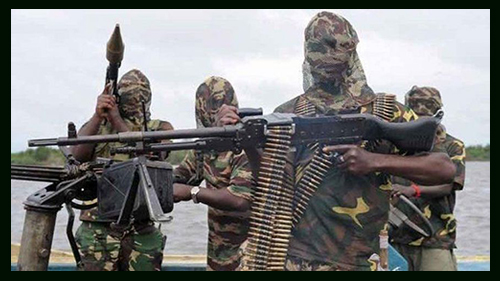
The ambiguous come into being and reign of Boko Haram terrorist group.
(2002- 2014) The Bridge MAG. Image
In fact, Boko Haram is a militant Islamist Nigerian-based movement seeking to establish an Islamic state, or Caliphate. The terrorist group recently struck in Cameroon. In a statement delivered on 28th July 2014, the African Union strongly condemned the attack perpetrated on 27th July 2014 by the Boko Haram terrorist group against the Cameroonian locality of Kolofata, during which numerous people were kidnapped and several others killed.
The name Boko Haram means ‘Western education is forbidden’. According to recent statistics, the movement attacked schoolchildren and killed more than 5,000 civilians between July 2009 and June 2014, including at least 2,000in the first half of 2014 alone. The group was ascribed the status of a ‘terrorist’ organisation in 2013 by the U.S Department of State.
According to Amnesty International and as reported by BBC Africa on 31st March 2014, the latest death toll from Boko Haram attacks in North-East Nigeria reached 1,500.
The Israeli siege of Gaza is just the latest development in a long ongoing Israeli-Palestinian conflict, which has its origins in the mid-20th century. Both sides have failed to come to a peace agreement despite a long-term peace process.
When crisis strikes, whether in the form of terrorism or war, and whatever the reason, the world must act swiftly to mitigate human losses.
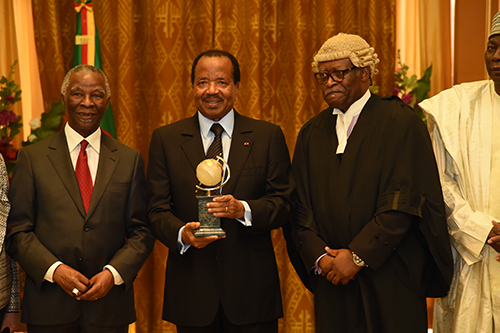
Cameroon President Paul BIYA won The Pan African Lawyers Union Prize for “Peaceful Resolution of Conflicts” on Friday 6th June 2014.
The Bridge MAG. Image
His Excellency Paul Biya has a long track record in the use of diplomacy and international justice to achieve peaceful resolutions to conflicts. On Friday 6th June 2014, the Cameroon President was awarded the Pan African Lawyers Union Prize for “Peaceful Resolution of Conflicts”.
The prize was handed to Biya by former South African President Thabo Mbeki. The lawyer’s delegation was led by Barrister Akere Muna, President of the Pan African Lawyers Union (PALU), and included the President of Transparency International, Huguette Labelle, the Cameroon Vice-Prime Minister Ahmadou Ali,Minister Pierre Moukoko Mbonjo, Minister Ferdinand Ngoh Ngoh, the Minister Delegate at the Ministry of Justice, Jean Pierre Fogui, the Assistant Director of the Civil Cabinet, Joseph Le, and Luc Sindjoun, Special Adviser to the Presidency of the Republic of Cameroon.
President Biya was awarded the prize for having presided over one of the most peaceful periods in the history of Cameroon, the country having not witnessed any internal conflicts in 40+ years since it gained independence. In this context, Cameroon hardly conforms to the African stereotype of war and famine.
In many respects the sheer ethnic plurality of Cameroon has served as a permanent deterrent against any internecine conflicts: with 250 tribes and ethnic groups making up its population, any ethnic feuds would prove apocalyptic for the nation.
The Cameroonians are, ironically, by dint of their tribal diversity, united in a common interest to maintain ethnic peace and cooperation and so avoid the horrific vicissitudes of, for example, the Rwandese.
In geopolitical, geostrategic, and global trade respects, Cameroon is the salubrious ‘hub’ of Central and West Africa.
The maintenance of peace in Cameroon is also of course beneficial to its neighbouring countries; as well as to foreign investors whose fiscal confidence is founded in Cameroon’s peace and prosperity, as well as its economic and commercial expansion, most recently seen in its deep sea port and pipeline- development capacities.
That is the reason why Yaoundé, the capital of Cameroon, was chosen to hold a Summit of 25 Heads of State and Government on Maritime Safety and Security in the Gulf of Guinea between 24th–25th June 2013.
The stoical Cameroonian ‘can do’ attitude is reflected in all manner of places across the country.
The relatively placid attitude of politicians in Cameroon towards domestic issues perhaps stems in part from their educational and academic backgrounds.
According to a profile of the country published by the BBC on 27th November 2011, Cameroon has one of the highest literacy rates in Africa; while two-thirds of the nation’s ministers and members of parliament have PhDs, mostly gained from Western universities.
The remaining third hold the academic rank of Professors in fields as varied as economic sciences, medicine, law, social sciences, finance and physics.Many have lectured, as well as studied, at Western universities.
It is believed that such broad academic grounding has helped Cameroonian politicians embrace the trends of elections and examine the meaning of democracy with a more critical and mature approach than elected representatives in other countries.
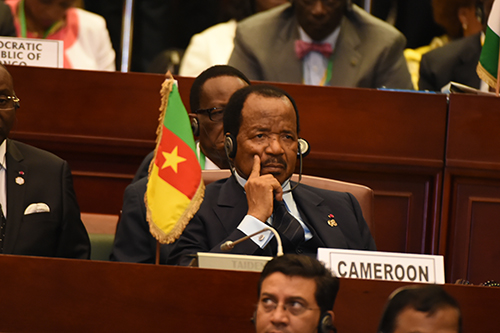
“Whether on land or at sea, near or far, terrorism defies the rules of civilised societies. It thrives on obscurantism and regression.”
Cameroon President Paul BIYA . The Bridge MAG. Image
President Biya himself is considered a worldly and educated man. He studied, Law and Political Sciences at the University of Paris Sorbonne, an institution which is the equivalent of Oxford or Cambridge in Britain, or Havard in the USA.
A recent World Bank Indicator estimates the literacy rate of the overall population of Cameroon as 83. 3 %.
According toWorld Bank, the literacy rate is the percentage of people who can, with understanding, read and write a short, simple statement on their everyday life.
According to Cameroonian officials, Amadou Ali’s wife has been kidnapped and at least several people killed following an attack by Boko Haram in the Cameroonian locality of Kolofata. Amadou Ali is the Cameroon’s deputy Prime Minister.
It is believed that Boko Haram Stepped up cross-border attacks into Cameroon in recent days because the country has deployed army to the region, in a bid to join international efforts to combat the militants.
Commenting again on Boko Haram’s acts of terrorism, President Biya said:
“World peace can only be assured if the International Community upholds solidarity as one of the fundamental values in relations between nations. We can only rejoice in the ever-growing awareness of this obligation by a majority of States.
On the other hand, conflicts, whether internal or between State entities, affect the economic take-off of African States and their development in general.
Until international law finally prevails over the use of force, I remain convinced that it should be guided by law, notably in the case of self-defence. It is in this spirit that we have taken measures to defend ourselves against the terrorist actions of Boko Haram in Nigeria.”
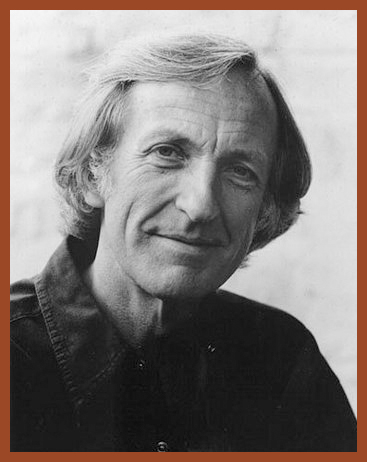
“Forget the secret Anglo-American sponsorship of jihadists as a “bulwark” against democratic control of oil.” John PILGER in Hidden Agendas. The Bridge MAG. Image
London-based award-winning Australian investigative journalist and political activist,
John Pilger, wrote and produced two films –25 years apart– on the Palestine issue, both titled Palestine is Still the Issue, in order to emphasize how nothing has changed in the region in over two decades.
Pilger is arguably the most outspoken and uncompromising journalist of his generation.
In a recent interview with the American producer and co-host of the Flashpoints Radio news programme, Dennis Bernstein, Pilger summarised the Gaza issue thus:
“We should understand this has nothing to do with Hamas, or rockets. It is an ongoing assault on the Palestinian people –and especially the people of Gaza– which began a very long time ago, and the plan is to effectively get rid of them as an entity. And I’m not exaggerating, it’s often difficult to reach back into the history at times like this, but it’s very important that we contextualize it.
The infamous Plan D that was executed in the late 1940s just before Israel came into being was to expel the population of Palestine; to get rid of them. 369 villages were attacked, the people thrown out. The record is there. Historical record is very clear, Israeli historians, Benny Morris through, have documented this; the Hebrew archives have thrown it up.”
Then, when prompted by Dennis Bernstein’s remark:“One has the sense they [the Israelis] are using the Gaza strip as a testing ground for the latest kind of weaponry, technology, jamming equipment for larger wars”, Pilger replied:
“It’s really the United States that is pushing the buttons. Because it’s only Israelis who are flying the American planes. Those are American planes supplied for this very exercise, and if you look at the response of President Obama you understand that this is, in effect, an American/Israeli assault on a people who live in effectively an open prison.”
Threading throughout both the Gaza imbroglio and the ambiguous birth and reign of Boko Haram, is the black comedy of arms manufacture.
Are the real culprits behind the world’s armed conflicts the arms capitalists? In terms of material gains through business and profits, they would seem to be the main –if only– beneficiaries of war and terror. So that when we hear that much-used phrase “War on Terror”, should we not detect in it something of a grotesque paradox –that it is in itself a form of ‘terror’?
The ugly truth: warmongers, “merchants of death” and the ethical meltdown of arms capitalism.
Arms manufacturers from around the world have always been skilled at shaping and manipulating peoples’ consciences and behaviours in order to divide, wreak havoc, and then to turn in a profit from doing so.
As long as there is instability throughout the world, there is potential to help tip random nations into war zones and consequently perpetuate a profitable arms trade.
In his 1998 book, Hidden Agendas, Chapter 2, ‘Flying the Flag, Arming the World’, John Pilger wrote:
“Today, Britain is the world’s second largest arms exporter after the United States. In no other export sector is Britain so successful as in the arms business.
…The most famous arms dealer of all was Sir Bazil Zaharoff, whose reputation popularised the term ‘merchant of death’. Zaroff understood the connection between arms and power, diplomacy, spying and bribery, and flying the flag, regardless of whose flag it was. “I made wars so that I could sell arms to both sides” he declared.”
Gaza has needlessly turned into a global ‘Dreyfus Affair’ of the modern era.
Gaza has needlessly turned into a global ‘Dreyfus Affair’ of the modern era, in that the whole world has been divided into two sides.
While the historical and moral roots of the Israel-Palestine conflict are obfuscated for profit by arms manufacturers, the world’s witnesses are being split into two attitudinal camps: the pro-Israeli and anti-Israeli; just as in the ‘Dreyfus affair’ when, a few centuries ago, those who supported Dreyfus(‘Dreyfusards’),and those who condemned him (the ‘anti-Dreyfusards’), were split.
The ‘Dreyfus Affair’ was a political scandal that divided French opinion from its inception in 1894 until its resolution in 1906. It is usually seen as a modern and universal paradigm for state-facilitated injustice.
The ‘Dreyfus Affair’ remains one of the most compelling examples of ambiguous miscarriages of justice where the major role was played by the press and public opinion.
But to think outside of the ‘Dreyfus’ paradigm, if we ask ourselves, Who are the real beneficiaries of the arms trade?, then we will find that the true culprits behind such conflicts are not actually its protagonists, but those who supply the weapons to its protagonists.
To sum up, arms manufacturers are ultimately responsible for the human devastation caused by armed conflicts and terrorism.
Chomsky once wrote: “Everybody is worried about stopping terrorism. Well, there is a really easy way: stop participating in it”.
Indeed, if one does not fan the flame then it will extinguish itself.
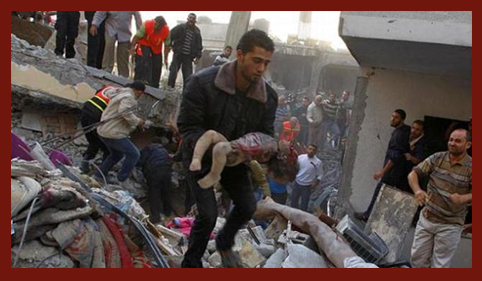
Gaza has needlessly turned into a global Dreyfus Affair of modern era.
Gaza gruesome death toll of civilians is beyond belief The Bridge MAG. Image
At a time when the world is witnessing a globalisation of terror and war, the point here and now regarding the Gaza issue is not about which side is wrong or right, or whether we are pro- or anti-Israel.
It is about raising awareness among populations, regardless of their geographical locations, that war and conflict are the products of global capitalism. This will help prevent civilians from being manipulated by arms manufacturers who will always come out with vile excuses to fuel war, terror, and, consequently, their profitable arms trade.
Toward conflict resolution and peace
Skilful spin doctors are constantly helping arms manufacturers to ‘justify’ the killing and destruction of generations in their own narrow economic interests. They will even euphemise the human costs of conflicts as ‘collateral damage’.
Encouraging a state of armed conflict between different nations or states, or different groups within a nation or state, is unequivocally wrong.
We can only conclude that if international capitalism is dependent on perpetuating global conflicts in order to sustain its economic productivity, then it has not only completely lost its moral compass, but has also lost its right to continue in its current form.
From either side, whatever the reason, the killing of innocent civilians is wrong and cannot be justified in any supposedly civilised world.
To whom should we look as a guardian of public ethics? There seems to be one law for the lawmakers and another for the public.
British and other Western powers have built their empires on war and the arms trade.
As Pilger said prophetically only a few months ago in the New Statesman:
“The uprising in Egypt is our theatre of the possible. Fear of Lord-knows-what requires that the historical truth of US and British ‘diplomacy’ as largely responsible for the suffering in the Middle East be suppressed or reversed. Forget the Balfour Declaration, which led to the imposition of expansionist Israel. Forget the secret Anglo-American sponsorship of jihadists as a “bulwark” against democratic control of oil.”
We are living in an age of discipline, culture and civilization, but our ethical development could take centuries to catch up.
The world is in a permanent climate of insecurity, terror and war. Unregulated greed and selfishness have taken their toll on 21st century humanity.
If our world wants to achieve the ambitious agenda of the 2015 millennium goals, one major task facing us today is to create a spiritual reconciliation between the continents of the world.
If there is one abiding metaphor that best sums up our predicament as humans, it is surely that we all inhabit the same boat of the human race; and the boat will hit the iceberg if governments and civilians cannot see beyond the greed of arms manufacturers, and start focusing on shaping humanity’s future, rather than destroying it.
On 10th August 2014, The Bridge Magazine was invited by Cornwall-based Veronica Vickery of UK Gov.org to sign a petition asking ‘The Rt Hon Philip Hammond MP: to send the RFA Argus hospital ship to Gaza.’ The petition has now gathered 69,903 signatories.
In her petition, Veronica Vickery wrote: ‘I have watched with horror the tragic loss of life and destruction in Gaza. A health crisis is looming in Gaza for trapped civilians, with dire conditions in the main Gaza City El Shifa hospital. We request that the British Government unilaterally and rapidly deploys RFA Argus to Gaza.’
For sure, the solidarity in which civilians from around the world together with many humanitarian associations and non-governmental bodies recently shared while grieving with the families of Gazan victims, was a powerful demonstration of global compassion and universal tribute to the inalienable sanctity of the whole human race.
Let us hope that President Paul Biya’s message of peace on security issues in Africa and worldwide will shine around the world and ultimately cast the plagues of terrorism and war into the darkness of history.


Dear Kathy,
Thanks for taking time to drop some positive comments on my post.
Your support is very much appreciated.
With very best wishes
Rachel